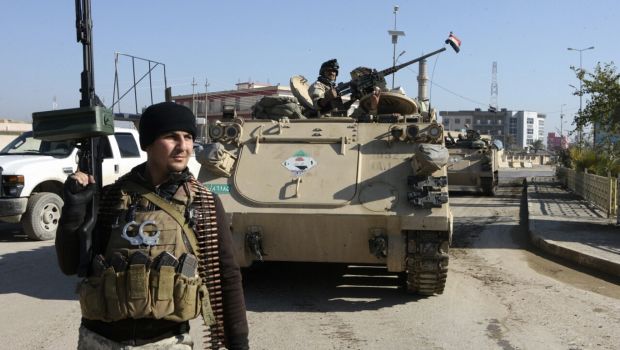
Iraqi soldiers take part in an intensive security deployment in Ramadi, 62 miles west of Baghdad January 24, 2014. (REUTERS/Stringer)
The Iraqi army’s Anbar Operations Command announced on Saturday that it had killed several members of the Al-Qaeda-linked Islamic State of Iraq and Syria (ISIS) east of Ramadi.
The statement said: “The security forces during the military operations in Anbar killed 20 members of the Islamic State of Iraq and Syria organization and destroyed one of their vehicles in the Bou Faraj district.”
Faris Ibrahim, a member of the Constituent Assembly, told Asharq Al-Awsat that “military operations in Ramadi are ongoing to complete the clearing of some of the areas where ISIS and Al-Qaeda terrorist groups and their supporters, who call themselves tribal revolutionaries, are present.”
The cities of Anbar and Fallujah in Iraq’s Anbar province were seized by insurgents who expelled Iraqi security forces in December, after over a year of mounting tensions between Sunni residents of Anbar and the central government in Baghdad, led by Shi’ite Prime Minister Nuri Al-Maliki, who Anbar’s protesters accuse of sectarian bias.
Some of the insurgents are reported to be members of radical jihadist groups linked to Al-Qaeda such as ISIS, and have been implicated in a recent wave of deadly bombings across the country.
Government forces are attempting to reclaim the cities with the help of pro-government tribal militias.
Ibrahim added: “The current operations, which are carried out by the army with the support of Iraqi people, the Awakening Movement and tribes, were concentrated around the Bou Faraj district, east of Ramadi, and it is expected that all targets would be dealt with in the next two days.”
Ibrahim added that other areas which were the scenes of operations in the last few days, such as Boubali, Khalidiyah and Saqlawiyah, “have returned to calm after completely clearing them of ISIS, but that there are sleeper cells which will be dealt with in the coming days.”
In Fallujah, scattered fighting was reported in the last few days between insurgents and government forces and allied tribal militias.
The commander of Iraqi military operations in Anbar, Lt. Gen. Rashid Flaih, denied reports that civilians had been killed by government artillery fire on Saturday. However, a number of Fallujah residents and doctors at the city’s hospital said the three days of bombardment have killed and injured dozens of civilians.
Flaih said in a statement broadcast on TV on Saturday that it would take 10 days to destroy the ISIS presence in Fallujah.
He said: “The Iraqi army has weapons and equipment which are sufficient to fight the armed groups around the country.”
Flaih said it was ISIS who targeted civilians, not the army, and that “terrorist groups and insurgents were using the industrial district to booby-trap cars and smuggle arms into the city.
Meanwhile, eyewitnesses told Asharq Al-Awsat that “Fallujah has seen the widest population displacement in the last two days because of the intense artillery bombardment.”
Sheikh Hamid Al-Kartani said: “mortar bombs which hit the area of Hay Nazzal on Friday killed a family of five.”
“The Dubbat and Askari districts and even the cemetery of Fallujah have seen bombardment, prompting people to suspect unusual movement which caused mass migration out of the city,” he added.
A doctor who requested to be identified only by her first name, Ilham, said: “Female staff have left the city’s hospitals, leaving male doctors and nurses to treat humanitarian cases.”
She added: “They have taken up accommodation in the hospitals because their families have left the city.”
A security source in Anbar province said that 12 people were confirmed to have been killed or injured by mortar bombs fired by the army on various areas of Fallujah.
The leader of Anbar Provincial Council, Sabah Karhout, issued a statement which said “Fallujah is facing a humanitarian crisis if the current situation continues,” adding that “it is very important to send humanitarian aid to help the residents of the city.”
On Friday, a UN official said that 140,000 Iraqis had fled the province as the violence between the government and insurgents continued.
A spokesman for the UN High Commissioner for Refugees told reporters that 65,000 people had fled the province in one week alone, and that the situation was the biggest movement of people since the peak of sectarian violence in the country between 2006 and 2008.
